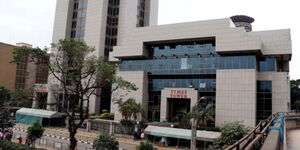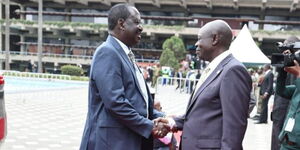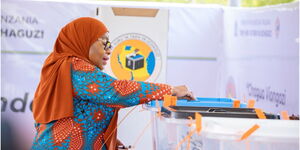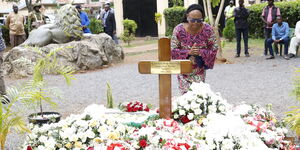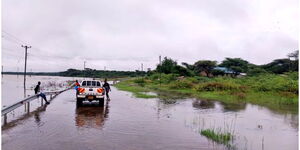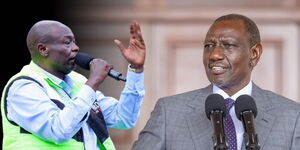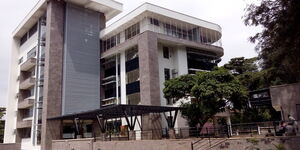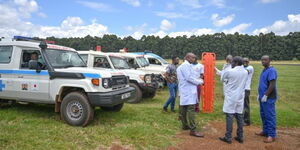Kenya is set to make its debut in the highly anticipated 2024 Africa Nations Championship (CHAN), as one of the hosts in the biennial tournament comprising 19 teams.
Led by coach Benni McCarthy, the Harambee Stars will be aiming to make their mark in the tournament, which pits the best players based on the African continent against each other for the ultimate prize of being crowned kings of local continental football.
Alongside Tanzania and Uganda, Kenya will host the event, which will officially begin on Saturday August 2 at the Benjamin Mkapa Stadium in Dar es Salaam, Tanzania, and conclude on Saturday August 30 at the Moi International Sports Centre in Nairobi, Kenya.
Amplifying the high-stakes nature of the competition, Kenya was immediately thrown into the deep end, being pitted against the Democratic Republic of Congo (DRC), Angola, Morocco, and Zambia in what promises to be a tough group.
This is something that coach McCarthy and team captain Aboud Omar acknowledged, but embraced the tough draw as an opportunity and challenge, rather than a setback.
McCarthy has often joked that Kenya was in a challenging group and even "blamed" former Kenyan international Macdonald Mariga, who was part of the draw ceremony, for the tough grouping.
Despite the humour, his underlying message was one of excitement and a proactive mindset. He views it as a 'fantastic challenge', noting that, to win any major tournament, you eventually have to beat the best.
This is particularly pertinent as Kenya is set to come up against two former winners: the Leopards of the DR Congo and the Atlas Lions of Morocco.
Group A Test
DR Congo is one of the most successful nations in CHAN history. They are two-time champions, having won the inaugural tournament in 2009 and again in 2016. They also have the record of the most appearances in CHAN (seven).
Their success is believed to stem from a robust domestic league (Linafoot) that produces highly technical and physically gifted players. This, together with being tactically astute, coupled with a blend of flair and resilience, makes them a hard nut to crack.
Also, their players have bags of experience in continental football, through their participation in continental club competitions (CAF Champions League, CAF Confederation Cup), which translates to strong performances in CHAN.
Ironically, Kenya will begin their CHAN challenge with the DRC, facing them in a crunch match on Sunday, August 3, at the Moi stadium in Kasarani.
After the game against DRC, Harambee Stars will lock horns with Angola, nicknamed Palancas Negras, known for their rigid defensive solidity and devastating attacking flair.
Angola has a respectable CHAN history, having reached the final in 2011, where they finished as runners-up to Tunisia. This will be their fifth appearance. Angola will be seen as a dark horse, as their resilience and tactical discipline could make them a very difficult opponent, especially in a group where every point will be crucial.
From Angola, Kenya will face arguably one of the competition’s favourites in Morocco, a team ranked 12th in the FIFA world football rankings.
In Morocco, Kenya will come up against a two-time CHAN winner, achieving the feat in remarkable fashion, winning back-to-back titles in 2018 and 2020.
Their strength across all levels stems from their domestic football, which is highly professional and well-resourced, benefiting from significant investment in infrastructure and youth development. Their local league (Botola Pro) is strong, and their players are technically proficient, tactically disciplined, and often play at a very high tempo.
They also have a winning mentality forged by recent international successes, such as becoming the only African side to reach the semi-finals of the FIFA World Cup. Overall, Morocco's recent dominance in CHAN makes them formidable. Their players are likely to be well-drilled and highly motivated.
Despite the high stakes involved, Aboud Omar, the Harambee Stars captain, has been particularly vocal about downplaying the historical success of opponents like DR Congo and Morocco. He stated, "History counts for nothing. That was their performance then, but football is about today."
The final team in Group A is the Chipolopolo of Zambia, who are expected to bring in an added level of unpredictability and danger to the group. On their day, they are capable of beating any team with their attacking flair, pace, and a never-say-die attitude.
Zambia has a decent CHAN record, with their best performance being a third-place finish in the inaugural 2009 edition. This will be their fifth appearance in the competition.
Kenyans Urged to Turn Up in Numbers
Despite the fierce threat by the four nations, Harambee Stars has the crucial home advantage. This means passionate home support, familiar conditions, and minimal travel, which can be a significant boost.
As CHAN is explicitly designed to promote local players, the tournament presents a massive opportunity for Kenyan players such as Mohammed Bajaber to showcase their skills on a continental stage, potentially attracting scouts from bigger leagues in Africa and beyond.
Also, a strong performance, especially against such formidable opponents, would significantly boost Kenya's footballing reputation. It is a chance to prove the strength of the local league and the quality of homegrown talent.
For the fans, it is an opportunity to experience high-level continental football at home and rally behind their national team.
Notably, this tournament is a "dress rehearsal" for the 2027 Africa Cup of Nations (AFCON), which Kenya, Tanzania, and Uganda will also co-host. A successful CHAN is vital for demonstrating Kenya's organizational capabilities and building a positive footballing momentum towards AFCON 2027. This includes testing infrastructure, logistics, and fan engagement.
However, Kenya will need to be tactically disciplined and exceptionally organised if they are to capitalise on every opportunity. Surviving this group would be a monumental achievement that would send a strong message about the progress of Kenyan football.

